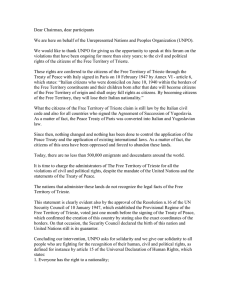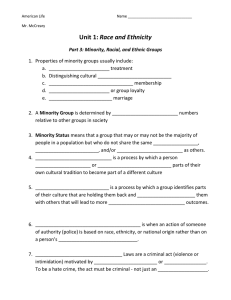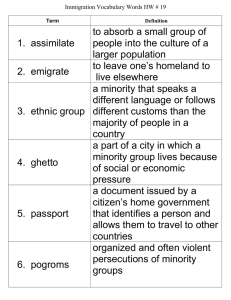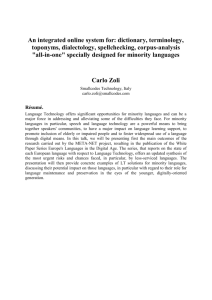Dear Chairman, Ladies and Gentlemen,
advertisement
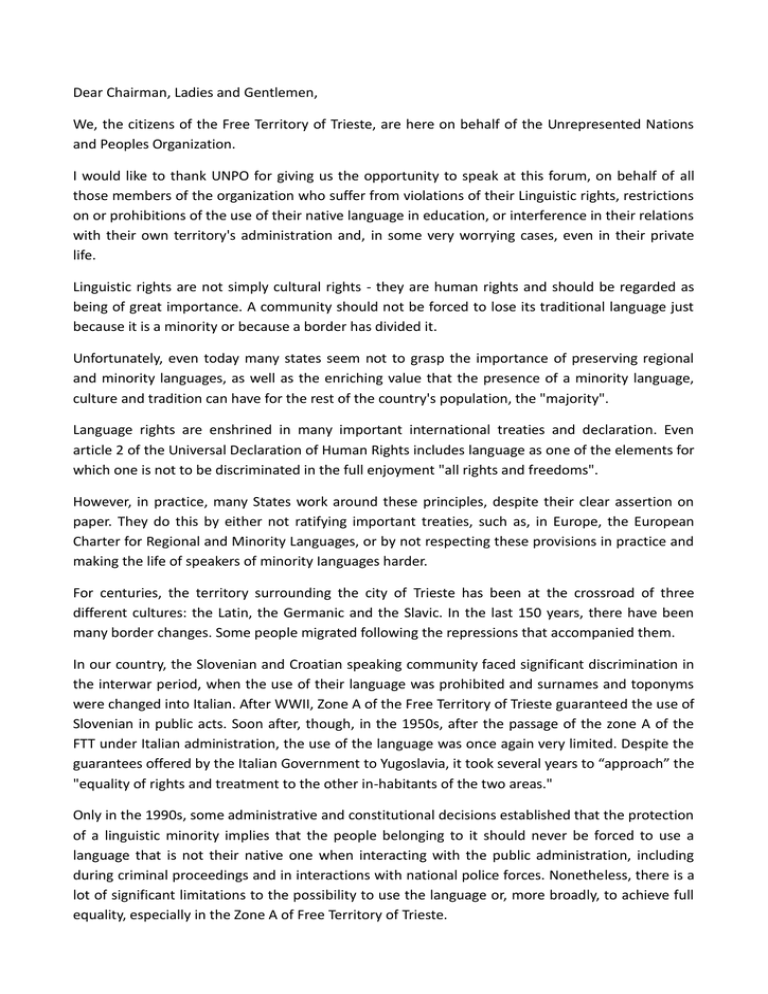
Dear Chairman, Ladies and Gentlemen, We, the citizens of the Free Territory of Trieste, are here on behalf of the Unrepresented Nations and Peoples Organization. I would like to thank UNPO for giving us the opportunity to speak at this forum, on behalf of all those members of the organization who suffer from violations of their Linguistic rights, restrictions on or prohibitions of the use of their native language in education, or interference in their relations with their own territory's administration and, in some very worrying cases, even in their private life. Linguistic rights are not simply cultural rights - they are human rights and should be regarded as being of great importance. A community should not be forced to lose its traditional language just because it is a minority or because a border has divided it. Unfortunately, even today many states seem not to grasp the importance of preserving regional and minority languages, as well as the enriching value that the presence of a minority language, culture and tradition can have for the rest of the country's population, the "majority". Language rights are enshrined in many important international treaties and declaration. Even article 2 of the Universal Declaration of Human Rights includes language as one of the elements for which one is not to be discriminated in the full enjoyment "all rights and freedoms". However, in practice, many States work around these principles, despite their clear assertion on paper. They do this by either not ratifying important treaties, such as, in Europe, the European Charter for Regional and Minority Languages, or by not respecting these provisions in practice and making the life of speakers of minority Ianguages harder. For centuries, the territory surrounding the city of Trieste has been at the crossroad of three different cultures: the Latin, the Germanic and the Slavic. In the last 150 years, there have been many border changes. Some people migrated following the repressions that accompanied them. In our country, the Slovenian and Croatian speaking community faced significant discrimination in the interwar period, when the use of their language was prohibited and surnames and toponyms were changed into Italian. After WWII, Zone A of the Free Territory of Trieste guaranteed the use of Slovenian in public acts. Soon after, though, in the 1950s, after the passage of the zone A of the FTT under Italian administration, the use of the language was once again very limited. Despite the guarantees offered by the Italian Government to Yugoslavia, it took several years to “approach” the "equality of rights and treatment to the other in-habitants of the two areas." Only in the 1990s, some administrative and constitutional decisions established that the protection of a linguistic minority implies that the people belonging to it should never be forced to use a language that is not their native one when interacting with the public administration, including during criminal proceedings and in interactions with national police forces. Nonetheless, there is a lot of significant limitations to the possibility to use the language or, more broadly, to achieve full equality, especially in the Zone A of Free Territory of Trieste. In the written report we have deepened the problems of minorities under Italian administration. Since the Permanent Status of the Free Territory of Trieste (Annex VI to the Peace Treaty with Italy) proclaimed that the official languages are Italian and Slovene, the administrator just in 2001 put in force a law known as "protection" to the Slovenian minority, which as territorially restricts that rights and at the same time in the other public offices it’s quite difficult to find personal able to master the minority language. The world need better protection, so we can all continue to live, work and learn in our language in our territory, without feeling like second class citizens. Thank you President and Members of this assembly for the opportunity to speak on this issue. Geneva, 24/11/2015
